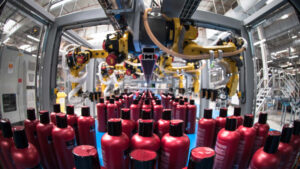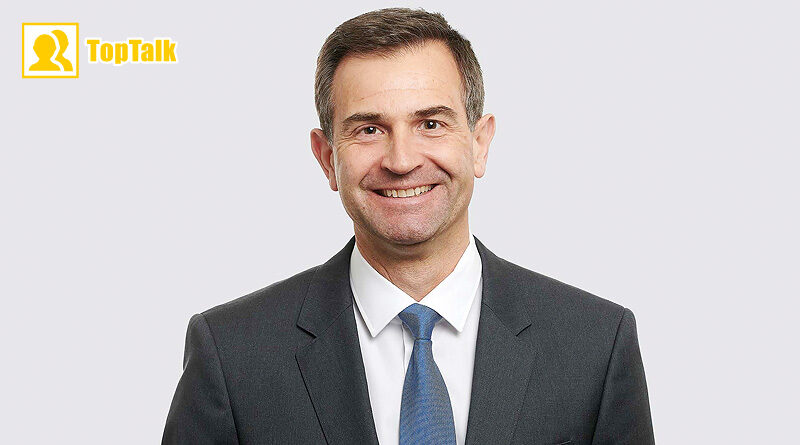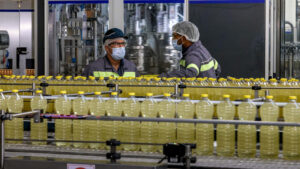Sidel’s food, home and personal care initiative
Interview with Sidel’s new Global Vice President, Mr Pascal Lefèvre
In April 2022 Sidel announced the appointment of Pascal Lefèvre as the new Global Vice President. He will develop and drive Sidel’s food, home and personal care (FHPC) strategy, meeting the unique needs of FHPC markets and delivering flexible, eco-friendly, tailor-made solutions that will address the new and complex retailing and distribution challenges facing customers.
PETplanet: Could you please give us some information on your personal background, experience and activities in the plastics and/or packaging industry prior to Sidel?
Pascal Lefèvre: I graduated with a Master’s from ISG Paris Business school and subsequently held a number of management positions with B2B businesses in the packaging equipment industry, specifically in blow moulding, labelling and injection equipment. I joined Sidel in 2020 as Vice President Europe & Central Asia for the FHPC market and was then appointed Global Vice President of food, home and personal care.
PETplanet: What are your main targets and challenges as Sidel’s new VP for food, home and personal care?
Pascal Lefèvre: FHPC markets are large and fragmented but are steadily growing, despite the current shortage crisis.
Sidel can provide innovative solutions that offer the flexibility, operability and product care demanded by these fast-moving and rapidly evolving market segments, while drawing on existing capability and expertise. We are looking to triple this key part of our business by 2030.
PETplanet: What is the main strategic approach to fulfil this target of tripling the FHPC business segment by 2030 and how will it be achieved?
Pascal Lefèvre: By establishing this new initiative, we can work flexibly and be much more agile. We are developing a new portfolio of machines and solutions that addresses the needs of the FHPC sectors. It is not only the high-speed machines but also our customers require mid-capacity equipment that reduces resource consumption and is flexible in any way.
PETplanet: How important is the topic of sustainability in the FHPC sector for you personally and what needs to be done here globally from your very own point of view?
Pascal Lefèvre: Sustainability is crucial in the FHPC sectors. We see that our customers require mid-capacity equipment that reduces resource consumption and is flexible. One product worth mentioning is Cermex Evopack, a secondary packaging unit. It reduces product repacking by managing those activities directly at the production line, thus cutting waste and energy consumption. Globally, more focus needs to be placed on delivering sustainable and environmentally conscious products and packaging that will meet or exceed the standards of those currently available.

PETplanet: How many employees work at Sidel overall?
Pascal Lefèvre: 5,119 employees. (Source: Tetra Laval Annual Report 2021/2022)
PETplanet: What is your current turnover overall?
Pascal Lefèvre: 1.4 billion euros in net sales. (Source: Tetra Laval Annual Report 2021/2022)
PETplanet: How many Sidel machines are roughly in use globally for this segment?
Pascal Lefèvre: Around 15,000 machines have been sold globally to the FHPC segment.
PETplanet: How has the company grown over the last years?
Pascal Lefèvre: Growth has been consistent across recent years. Obviously, the pandemic was a shock to everyone but the ways in which we’ve developed, especially in CSD and aseptic markets, is a testament to the hard work of everyone at Sidel.
PETplanet: Which markets are of specific interest for you at the moment and why?
Pascal Lefèvre: We are committed to the FHPC segment’s transition to sustainable packaging solutions in response to growing consumer demand, ensuring that manufacturers can play their part in the journey to net-zero. The FHPC market is a vast and interesting one and I think long-term solutions are a priority in it.
The markets related to hair care, liquid hand soap and home care are of specific interest to us, due to our expertise in designing and blowing bottles on our preferential heating blow moulding machines. The food market is also of great interest as this is where our packing and palletising solutions can handle most customer requests.
PETplanet: Are customers interested more in complete lines or is it in specific machinery and equipment to be added to existing equipment?
Pascal Lefèvre: In the food segment, in the edible oil business or sauce & dressing, our expertise mainly relies on delivering complete lines. In the HPC segments, most enquiries are for stand-alone equipment.
PETplanet: What role does the sale of downstream equipment play in your planning?
Pascal Lefèvre: End-of-Line equipment is key. It is the ‘backbone’ of our FHPC activity, with a growing need to bring agile and low energy consumption solutions.
At Sidel we always plan for customer solutions that cover the complete production line process, right up to packaging and palletising products ready to be transported to supermarkets and wholesalers. By choosing Sidel, the customer has a one-stop shop for all their packaging needs, including downstream equipment such as packing, palletising and intralogistics systems.
PETplanet: How has your business been affected by the global demand for rPET in containers? What changes in your equipment designs have been adopted as result?
Pascal Lefèvre: Several aspects of recent legislation are driving beverage industry trends and there’s an increasing focus on sustainability. The European Single Use Plastics Directive (SUP), for example, impacts the circular economy of PET, defining the collection targets for PET beverage bottles to be at 77% in 2025 and 90% in 2029. It also requires increasing the share of rPET in beverage bottles, up to 25% by 2025 and 30% by 2030.
We are witnessing the impact of the consumer’s lifestyle on the industry. On-the-go consumption and healthy living trends are continuously increasing and they are forcing the beverage industry to downsize bottle formats in some beverage categories, like carbonated soft drinks (CSD) and aseptic. On the food, home and personal care side, we face a growing demand to use rPET and our expertise in this field supports our customers in reaching their own sustainability targets.
PETplanet: What is the market demand in terms of PET packaging for FHPC from your point of view and do you expect any changes, such as sustainability ambitions driven by brand owners?
Pascal Lefèvre: The FHPC markets have different challenges. They are large but also very fragmented and growing constantly. The rapidly increasing importance of e-commerce reduces the accuracy of sales forecasts and puts pressure on margins and consequently has a strong impact on manufacturing. Consumers demand personalised products in terms of health and convenience at affordable prices. All this, together with sustainability and digitalisation requires new thinking at every level. Furthermore, bottle weight reduction is a strong demand, in order to reduce the amount of plastic tonnage consumed while maintaining the required mechanical constraints of the container.
PETplanet: Which differences in packaging and demands can you observe when you compare this segment with the beverage segment?
Pascal Lefèvre: In the FHPC markets, production lines are smaller than in beverages but much more agile and flexible. With the SKU proliferation generated by e-commerce, our customers need to change formats very often, and they need to do so quickly and efficiently. We also see a change in the case counts; customers are going to both lower and higher case counts, in order to cater for the needs of increased personalisation.
PETplanet: What challenges, changes, and opportunities for Sidel have resulted from the Covid-19 situation?
Pascal Lefèvre: Covid-19 has led to shortages in components, notably semi-conductors, and that has had an impact on the global packaging industry, impacting lead times and forcing costs up. As mentioned earlier, e-commerce has grown rapidly during the pandemic and this has led to less certainty in sales forecasts for manufacturing. However, we are experiencing strong demand for our products and services and are working to refresh and renew our face-to-face contact with customers.
The pandemic and its causes have raised consumer concerns about food safety. To address these, we believe that food and beverage manufacturers are likely to pay more attention to food safety and traceability in every step of production. That can be reached by upgrading their existing solutions or by investing in equipment that is in compliance with regional, global and European food safety standards.
PETplanet: Are there any defined investments/purchases that will align with the target for trebling FHPC by 2030?
Pascal Lefèvre: Internal capabilities will be a core investment for Sidel and will include the utilisation of a comprehensive range of blowers and end-of-line solutions, including packers and palletisers, for any type of primary and secondary packaging. Sidel also offers complete or partial integrated lines in categories like edible oil, sauces & dressing, coffee and more. Nevertheless, we do not exclude the possibility of working on partnerships or acquisitions in order to cover the food, home and personal care markets we have selected.


